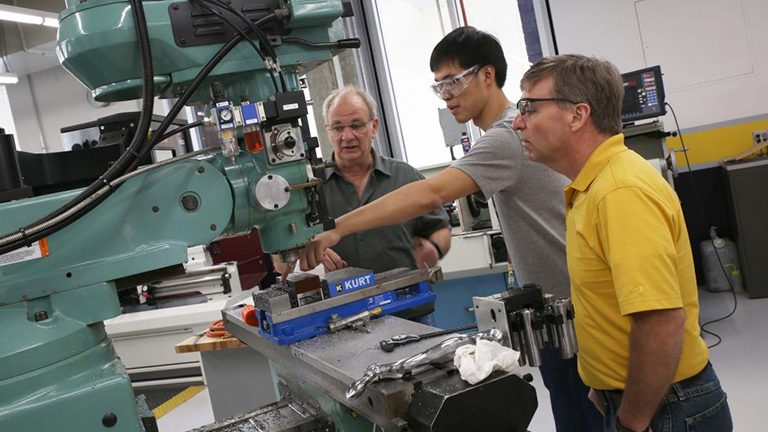Table Of Content

Special topics in information technology not included in the professional curriculum. This course provides an introduction to universal design focusing on the implications of ability on the usability of places, products, and systems for all individuals. Introduction to Industrial Design – a survey of evolving diverse career options and the designer’s impact on society. This installation explores the tension between human and machine agents in generative processes, inspired by Do Androids Dream of Electric Sheep?. The stylus input is transformed into a matrix of locally and globally affected outputs.
Design Students Explore Their Creative Side in an "Ear Art" Course at Georgia Tech - Core77.com
Design Students Explore Their Creative Side in an "Ear Art" Course at Georgia Tech.
Posted: Fri, 25 Aug 2017 07:00:00 GMT [source]
Resurging Atlanta IDSA Links Students to Industry
This graduate course focuses on product opportunities highlighting user benefits from soft material integration. This class will focus on developing advanced, traditional (non-digital) sketching, rendering, and presentation techniques. Introduction to research-based approaches to integrated healthcare design innovation.
Arizona State University
Production Editor, Embedded Computing Design, has responsibilities that include handling the news cycle, newsletters, social media, and advertising. This minor must comprise at least 15 credit hours, of which at least 9 credit hours are upper-division coursework (numbered 3000 or above). The first step toward completing a final dissertation is to receive formal approval of a dissertation research topic. Students must present their dissertation research proposal to the Thesis Advisory Committee no later than the end of Spring semester of the student’s third full year in the program.
D-School Futures: Georgia Tech's Jim Budd on Why There Has Never Been a Better Time to Pursue a Career in ... - Core77.com
D-School Futures: Georgia Tech's Jim Budd on Why There Has Never Been a Better Time to Pursue a Career in ....
Posted: Wed, 10 Sep 2014 07:00:00 GMT [source]
Master's Degrees

Through eleven research labs, fabrication and prototyping shops, design studios, and multidisciplinary collaborations, students gain exposure to practical skills valuable to many industries. Upon completion, MID graduates gain versatility in industry due to their unique blend of skills. From positions in product design, UX/UI design research, to strategy and consulting, our alumni are equipped to fill a critical and growing need for tech-savvy and data-driven user-first advocates. This course focuses on interface prototypes, how these are used throughout the design process and the varity of ways they can be created with different technologies. Through interface prototypes, students learn how to express their research, receive user feedback, explore user perceptions, and improve their designs. This course examines opportunities for designers to leverage visualization and prototyping methods to foster new applications of technology to enhance user experience in everyday life.
The lab facilitates courses related to the application of sensor-based technologies for use in everyday products and systems. This course focuses on the development of research-through-design skills particular to their application in interaction design. This course explores the future of wearable technologies for health by adopting various human-centered design methodologies to meet users’ needs, abilities, and expectations. This course provides an advanced level to universal design focusing on the implications of ability on the usability of places, products, and systems for all individuals.
Applications for Fall 2024 admissions to the Master of Industrial Design (MID) program have closed. Please check in at a later time for finalized Fall 2025 admissions cycle deadlines and information. All International Plan participants must develop proficiency in a language other than English. Unless otherwise approved, the language chosen to fulfill this requirement will have a relationship to the country or region in which the student plans to fulfill the 26 week requirement. Any variance will require approval from the IP faculty representative and the IP Committee.
Art and Technology Harmonize in School of Music
These classes are the minimum requirements students with a previous degree other than industrial design need before proceeding into the graduate-level studios and coursework. Introduction to the theory and practice of graduate studies in Industrial Design in relation to human-centered design, assistive technology, interaction, product system design, usability, user experience, interface, and instructional design. Comprehensive projects incorporating an iterative approach to user-centered design development of products, systems & services with emphasis on invention, innovation and entrepreneurship. Comprehensive team-based projects incorporating an iterative approach to design development of products, & systems with emphasis on integration of research, user-centered design, prototyping, usability and testing. The Georgia Tech School of Industrial Design offers a well-rounded course of study with early emphasis on basic design and design skills. The program encourages students to develop a diverse background in order to expand individual talents and to respond to changing opportunities in the field.
Our industrial designers are trained to deeply understand and empathize with user needs, adopting a practical, user-centric methodology to design not just products, but comprehensive systems, services, and experiences. Their role is crucial in the innovation process, acting as strategic partners who effectively bridge various professional disciplines and business goals. Georgia Tech industrial designers are uniquely equipped to lead in technical environments regarding topics such as parametric modeling, rapid prototyping, interactive environments, wearable technology, universal design, and assistive technology. We take a fundamentally different approach from industrial design programs rooted in the fine arts. Our program offers three distinct tracks, each targeting a unique aspect of design innovation. The Product Development and Innovation track delves into advanced design and manufacturing, emphasizing parametric modeling, 3D scanning, advanced materials, and digital manufacturing for diverse product applications.
Research, Design, Tech Focus
The application of systematic user-centered design methods to projects focused on new applications of sensor-based technologies with an emphasis on interactive environments, interfaces, navigation and mobility. The application of systematic user-centered design methods to projects focused on the design development of 'real-world' products, services, interfaces & systems in collaboration with external sponsors. The application of systematic user-centered design methods and research to projects focused on the use of parametric design and CNC capabilities in the design development of products, services & systems. As part of a top-ranked research institute, we believe design operates best in collaboration. Our students offer solutions using user-focused research and our design philosophy influences innovation throughout Georgia Tech. Our approach integrates design, technology, and business, focusing on making the design of technology and systems more human-centric through interaction, healthcare, service, and product design, as well as user-experience research.
Georgia Tech Industrial Design uniquely prepares students for leadership roles in the design world, particularly in technical fields. Our curriculum goes beyond traditional design principles, equipping students with advanced skills in parametric modeling, rapid prototyping, interactive environments, wearable technology, universal design, and assistive technology. This technical focus distinguishes our program from those with a fine arts orientation. Students learn to integrate these technological skills into their design processes, making them adept at transforming inspiration into functional, user-centered designs. This blend of artistic and technical training positions our graduates as innovators and leaders in the highly technical and evolving landscape of industrial design.
This course applies structured user-centered design methods to research and exploration of product design and function, and introduces concepts of universal design. This course applies more structured design methods to research and exploration of product form and function and introduces concepts of universal design and user centered design. As large and small companies increasingly continue to value designers, industrial designers have expanded their expertise beyond products. They strive to quantify the user's experience beyond tangibility, a trend that has spread industrial designers across all industries. As technology advances, industrial designers will be key contributors to the successes of wearable electronics, smart products, medical equipment, sustainable systems, and universal assistive products and technology.
This course provides an introduction to the design process on visual principles and presentation techniques with a focus on sketching and modeling techniques related to 3D form. In our classrooms, senior students engage in an expansive exploration of their roles in product and service systems design, brand and experience design, and design entrepreneurship. Collaborative studio work often involves prestigious Atlanta clients like Coca-Cola, Emory Healthcare, the CDC, NCR, MailChimp, Chick-fil-A, and Porsche, providing real-world experience. Senior students culminate their learning in a capstone design project, applying their comprehensive skills to solve significant problems. Many opt for interdisciplinary collaboration with engineers, combining design problem-solving with functionality to create effective, real-world solutions. Students who have an undergraduate degree in industrial design from an undergraduate ID program similar to Georgia Tech’s can complete a two-year program consisting of 48 graduate credits.

No comments:
Post a Comment